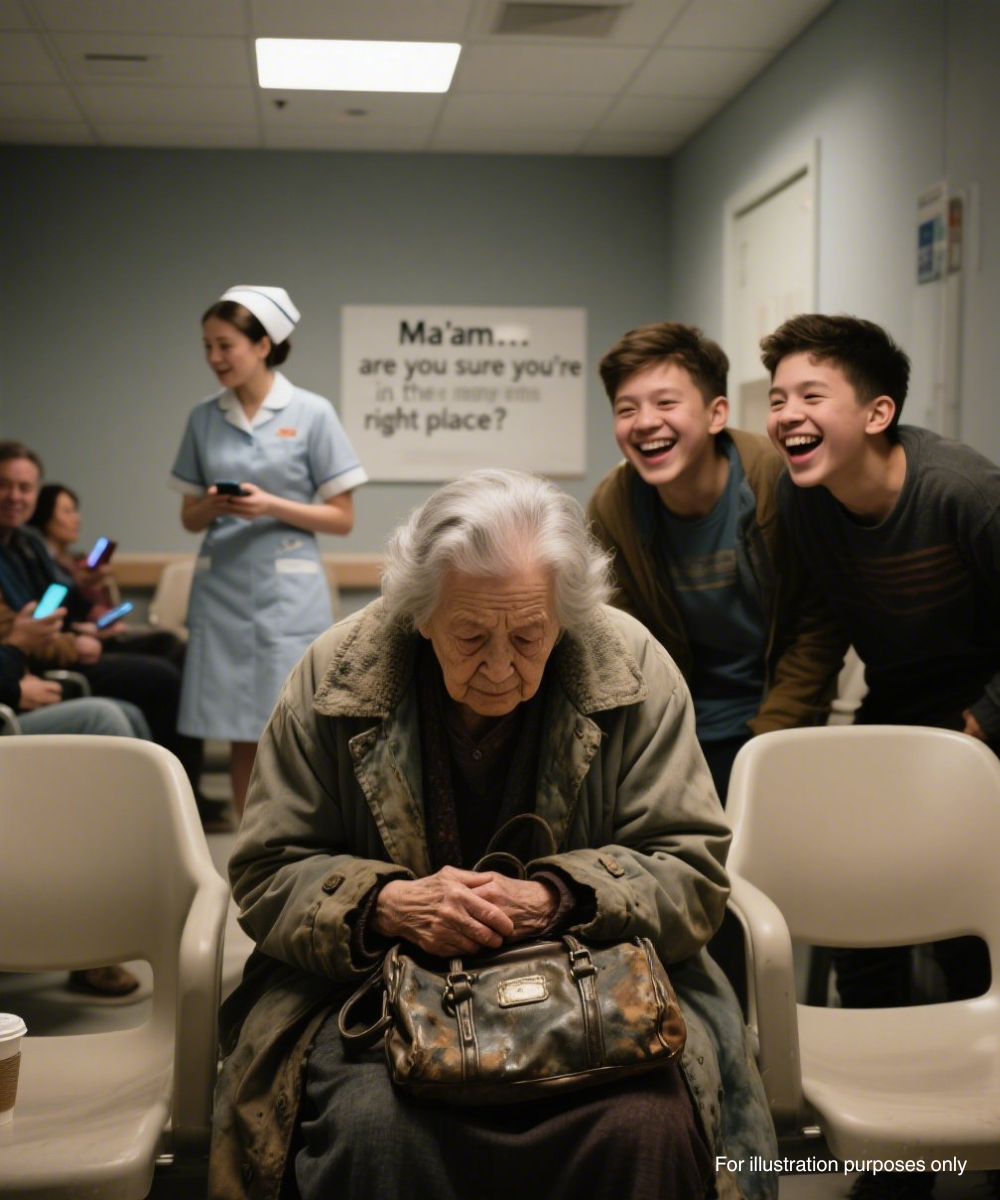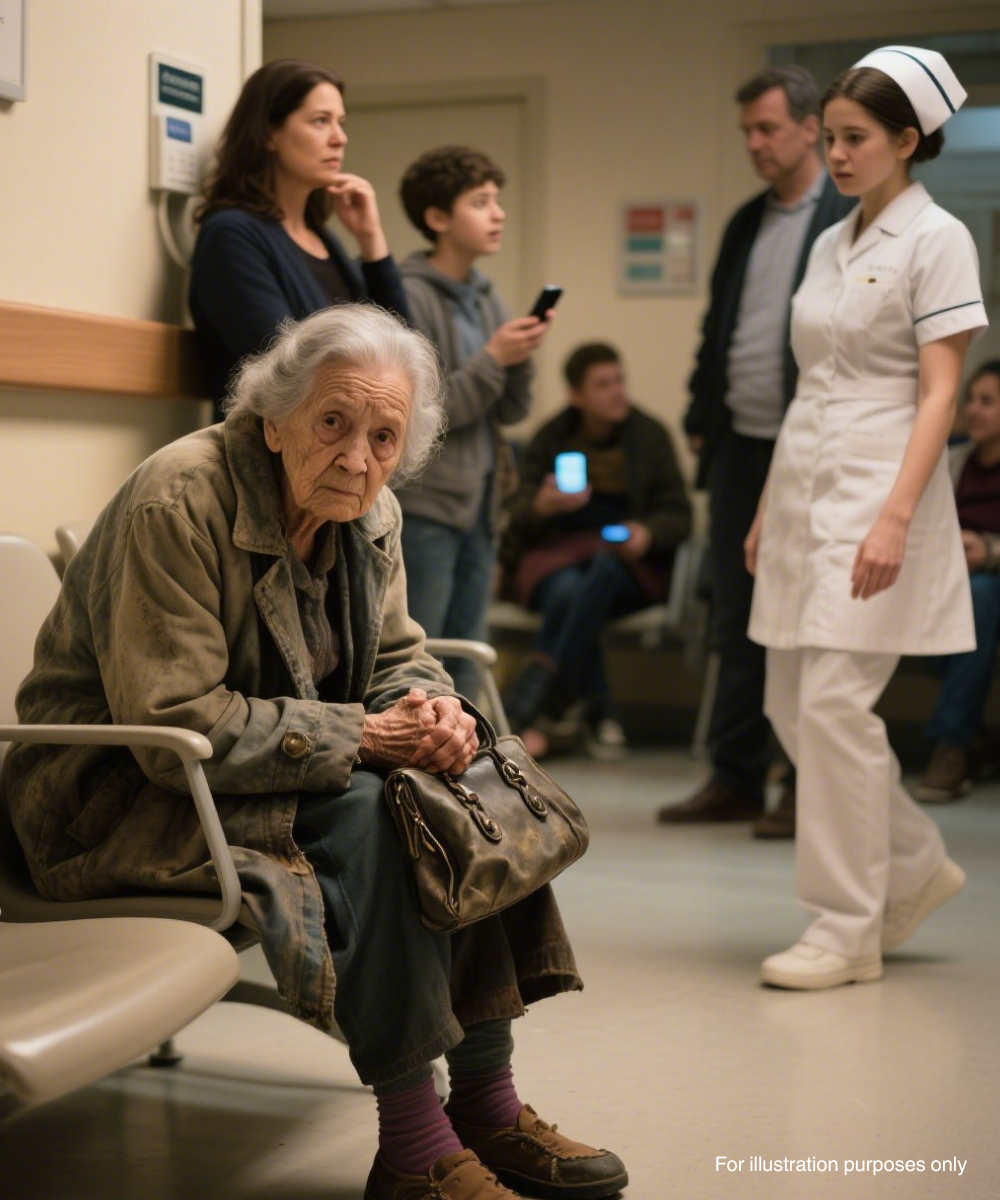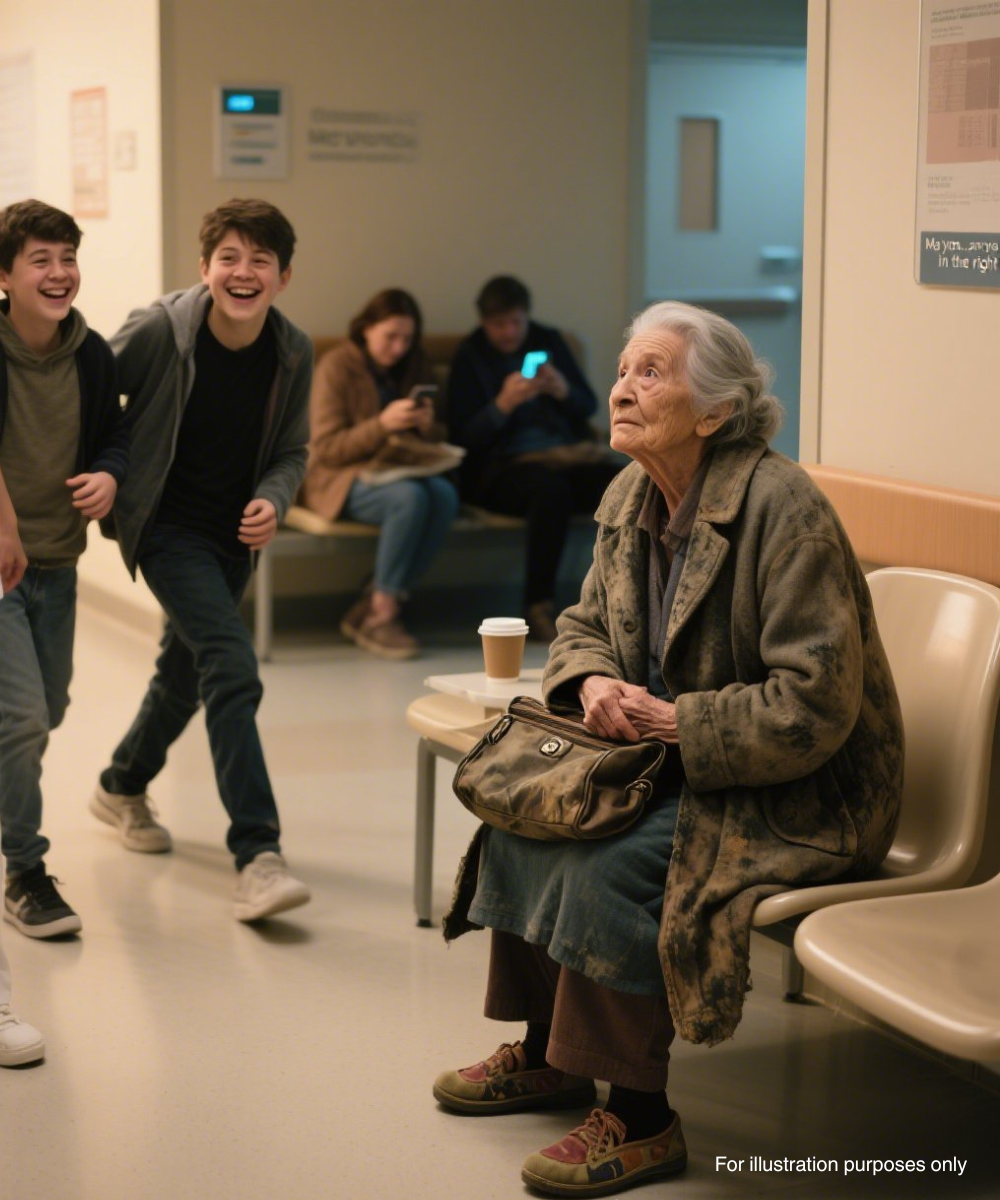The hospital waiting room was a symphony of quiet distress. Phones buzzed softly, vending machines clinked, and the flickering glow of fluorescent lights cast a clinical hush over the sea of worried faces.
In the farthest corner, barely noticed, sat an old woman.

Her coat, once pale blue, had faded to a washed-out gray. Its frayed cuffs mirrored her mismatched shoes—one brown, one black. Her weathered fingers clutched a worn leather purse tightly, knuckles pale from pressure. She didn’t shift. Didn’t speak. Only waited.
Around her, the room swirled with unspoken assumptions.
A woman in a designer scarf leaned toward her husband, whispering behind a manicured hand. “She must’ve wandered in from the street.”
He chuckled. “Here for the free coffee, probably.”
Two teenage girls nearby snickered, mocking the way the woman gently leaned forward now and then, as if expecting someone to call her name.
Even the hospital staff weren’t quite sure what to do. A young nurse, likely in her first week on the job, approached hesitantly.
“Excuse me, ma’am,” she said, crouching beside the chair. “Do you need help finding someone?”
The old woman looked up with soft, cloudy blue eyes. Her smile was warm but tired.
“No, dear,” she replied, her voice quiet but clear. “I’m exactly where I need to be.”
Puzzled but polite, the nurse nodded and walked away.
Minutes turned into hours.
People came and went. Families hugged, wept, paced. Children fussed. Doctors emerged and disappeared through double doors. But the old woman remained perfectly still, as though time had no hold on her.
Then, at precisely 3:12 p.m., the doors to the surgical wing burst open.
A man in green scrubs stepped into the waiting area. His cap hung askew, a mask dangled from one ear, and his face bore the weariness of someone who had just held a life in his hands. But his gaze scanned the room not for family or patients—but for her.
The old woman.
He walked past the anxious crowd. Past crying mothers, nervous spouses, and murmuring relatives. Until he reached her.
And then the unthinkable happened.
He smiled, knelt slightly, and rested a gloved hand on her shoulder.
“Are you ready to tell them who you are now?” he asked gently—but loud enough for everyone in the room to hear.
A hush fell. Conversations stopped mid-sentence. Heads turned.
The woman rose slowly, gripping his offered arm for balance. Her frame was frail, but there was strength in her poise. As she turned toward the room, her voice—though soft—carried.
“My name is Margaret Greene,” she began. “You may not know me. Most don’t anymore. But I used to run a small bakery just a few blocks from this hospital.”
There were murmurs. A few older heads nodded, recognizing the name.
“I never married. I never had children of my own,” she continued. “But there was once a little boy who lived above my bakery. His mother worked two jobs and still couldn’t keep the heat on. He was always hungry. So I fed him.”
She paused, her voice trembling slightly, but her eyes didn’t waver.
“I let him wash dishes after school for a bit of money. I taught him to read when the teachers said he couldn’t. I cared for him when he had no one else.”
The surgeon stepped beside her then. His voice, when he spoke, was full of quiet reverence.
“I was that boy.”
Gasps rippled through the crowd.
“My name is Dr. Nathaniel Lewis,” he said. “I’m Chief of Cardiothoracic Surgery here. Today, I performed my 1,000th heart surgery. A milestone in my career. And there was only one person I wanted to share that moment with—the woman who gave me my first shot at life.”
He turned to her again, emotion thick in his voice.
“She gave me food when I was starving. Books when I couldn’t read. Shelter when I had none. She believed in me when no one else did.”
A stunned silence gripped the room.

Then, Margaret smiled and added with a soft laugh, “I didn’t come here for free coffee. I came here for my boy.”
The tension shattered like glass beneath applause.
One nurse clapped first, then another. Soon, the entire room—strangers, patients, staff—stood and applauded. Not politely. Not out of guilt. But with genuine admiration.
The woman in the designer scarf looked away, cheeks flushed. The teenagers who had laughed now sat still, wide-eyed and wordless. The young nurse from earlier wiped at her eyes, overcome with emotion.
Dr. Lewis offered Margaret his arm again.
“I reserved us a table at the café,” he said. “They saved us a slice of chocolate cake.”
She chuckled. “You remembered my favorite.”
Together, they walked out of the room—not unnoticed anymore, but honored.

That evening, the hospital’s social media page posted a photo: Dr. Lewis and Miss Margaret sitting across from each other at a small café table, sharing chocolate cake, smiles warm, eyes glistening.
The caption read:
“Behind every surgeon is a story. Behind every success, someone who cared. Today we thank Miss Margaret Greene—for being the heart behind a thousand healed hearts.”
The post spread like wildfire.
Thousands commented, sharing their own stories of teachers, mentors, and quiet heroes who changed their lives. People around the country looked a little differently at those who sit alone in corners. A little kinder. A little slower to judge.
And somewhere, a woman who once baked blueberry scones for a hungry child found herself at the center of a legacy far greater than she’d ever imagined.
Because kindness—real kindness—is never forgotten. It just waits patiently, like Margaret, for the right moment to remind us of its power.
